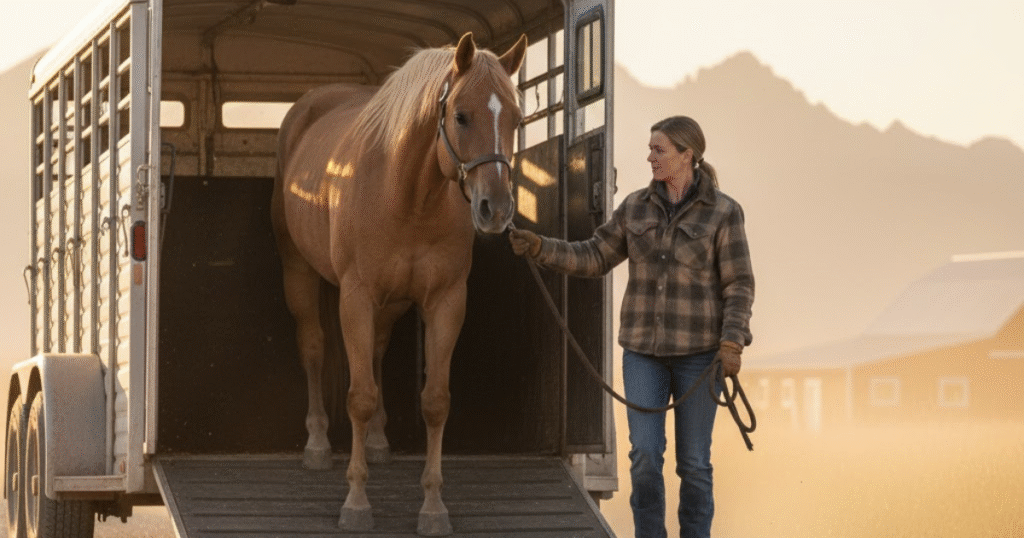
Moving to Colorado is an equestrian’s dream. The mountain trails, the 300 days of sun, and the vibrant horse community… are second to none. But unlike moving to other states, relocating a horse here involves a unique set of challenges. The high altitude, arid climate, and complex land use laws mean you need to do your homework before you load the trailer.
Asking the right questions upfront will save you from heartache, financial stress, and legal trouble. Here are the essential questions every horse owner must ask.
Moving to Colorado with Your Horse? Ask These 5 Questions First
🐎 Quick Summary: What You Must Know
- Will your horse need time to adjust? Yes. The altitude at 5,000+ feet and the dry climate are a shock. Plan extra hydration and 1 to 2 weeks of light work to acclimate.
- Is the water horse friendly? This is the number one deal breaker. Check that a property's well permit legally allows watering livestock, not just household use.
- Can you graze year round? Almost certainly not. Colorado is arid. Budget for buying and storing hay all year.
- What vetting is required? To cross the state line, you need a negative Coggins test within 12 months and a Certificate of Veterinary Inspection within 30 days.
- Is all land horse land? No. You must confirm allowed horse counts through county zoning and any HOA rules.
How Will the Altitude and Climate Affect My Horse?
This is the most immediate health consideration. Do not expect your horse to come off the trailer and go for a long trail ride.
Altitude
At 5,000+ feet, the air is thinner. Just like you, your horse will get winded more easily. Expect a 1 to 2 week acclimation period with plenty of turnout and only light work.
Hydration
The climate is very dry. You may not see sweat, but moisture loss is real. Some horses also drink less. Monitor water intake closely to prevent dehydration and impaction colic. Many owners use electrolytes or wet their feed.
Hoof care
Dry air can lead to cracking and chipping. Line up a great local farrier and consider hoof dressings or supplements.
Winter
Wind and sudden temperature drops matter most. A three sided run in shed provides a vital windbreak and is often more useful than a fully enclosed barn.
What Are the Legal Entry Requirements?
You cannot just load up and drive in. Like all Western states, Colorado has rules to protect its livestock population.
- Certificate of Veterinary Inspection (CVI): Issued by your current veterinarian within 30 days of travel.
- Negative Coggins test: Proof of a negative EIA test drawn within the last 12 months.
- Vaccinations: Not all are required for entry, but this is a good time to consult your new Colorado vet about West Nile, rabies, and other regionals.
What Does the Well Permit Actually Allow?
Water in Colorado is a property right, not a utility. If you buy a property, you are buying its water permit. Many wells on parcels under 35 acres are permitted for household use only, which forbids watering livestock, filling a pond, or irrigating a garden.
Do not trust a listing that says great for horses. Pull the well permit from the Division of Water Resources and verify the adjudicated use.
How Many Horses Can I Really Have?
Never assume the acreage tells the story. You need to check two sets of rules.
- County zoning: Rules differ. Douglas County uses an Animal Unit system, while Elbert County may have different rules for agricultural zones.
- HOA covenants: These often surprise buyers. Even if zoning allows five horses on ten acres, an HOA may restrict you to one or two.
Can I Feed My Horse Off the Land?
In most cases, no. Forget the lush, green pastures you may be used to. Colorado is arid, high desert.
- Plan on a dry lot: Most properties are dry lots or turnouts with limited native grass. This can be healthier for many horses and prevents founder.
- Plan on hay: Expect to feed hay 365 days a year. When you tour properties, make sure there is a dedicated, dry, accessible hay storage building that holds several tons.
We Can Help You Find the Answers
This list can feel overwhelming, but you do not have to figure it out alone. Relocating to Colorado is a big move, and it is our specialty.
Our team is expert in land, water rights, and county zoning. We know how to pull a well permit, what to ask an HOA, and which properties are truly turnkey for horse owners. Tell us about your horses and your dream, and we will help you find a safe, legal property that is ready for your arrival.
Frequently Asked Questions (FAQ) About Moving to Colorado
Do I need to blanket my horse in the winter?
It depends. A healthy horse with a full winter coat, access to a windbreak, and unlimited hay is often comfortable without a blanket. If your horse is older, clipped, or a hard keeper, a blanket is a good idea for the coldest days.
Where will I find a vet and farrier?
Colorado has a large, well served equestrian community. From world class equine hospitals, such as CSU in Fort Collins and Littleton Equine, to local farm vets and master farriers, you will have options. We are happy to share our trusted list.
What is the pasture rule of thumb in Colorado?
The old idea of two acres per horse does not really apply here. Think in terms of turnout space, not grazing. A five acre property is typically great for two to three horses in a dry lot setup, with hay provided year round.
